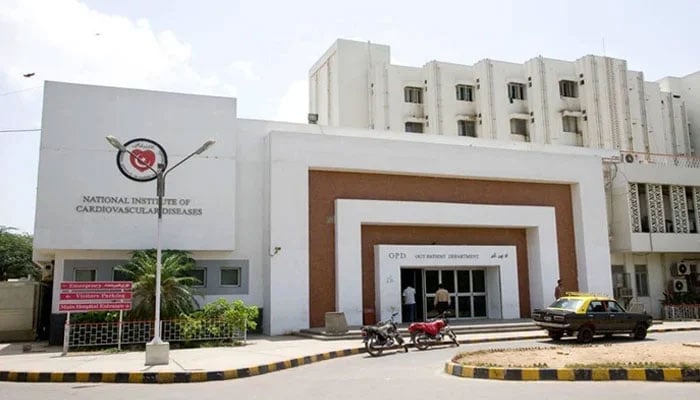‘NICVD has become world’s largest cardiac healthcare network’
NICVD has established 28 Chest Pain Units across Sindh to provide acute management of heart attacks.
Professor Tahir Saghir, Executive Director of the National Institute of Cardiovascular Diseases (NICVD), today held a media briefing to discuss the institute’s recent progress and expansion across Pakistan, including its network of satellite centers and Chest Pain Units.
He said the NICVD, established in 1963, is dedicated to the prevention, diagnosis, treatment, and rehabilitation of patients with cardiovascular diseases. Since its inception, the institute has expanded from a single hospital in Karachi to 10 hospitals across the province of Sindh, providing state-of-the-art cardiac services to patients from all walks of life.
“Today, NICVD hospitals can be found not only in Karachi but also in Sukkur, Larkana, Khairpur, Sehwan, Nawabshah, Hyderabad, Tando Mohammad Khan, Mithi (Thar), and Lyari. The institute offers comprehensive facilities including angiography, angioplasty, bypass heart surgery, laboratory and radiology services, outpatient consultation, hospitalisation, and medication, all free of charge,” he said at a media briefing on the NICVD’s progress and expansion.
Additionally, the NICVD has established 28 Chest Pain Units across Sindh to provide acute management of heart attacks. These units are strategically located under flyovers or at hospitals and clinics in cities such as Karachi, Ghotki, Tando Bago, Jacobabad, Umerkot, Tando Allahyar, Mirpurkhas, Shikarpur, Thatta, Kashmore, and Bhiria City. To date, these units have treated over 1.3 million patients without cost.
In total, the NICVD’s main hospital, satellite centers, and Chest Pain Units treat over 2.4 million patients every year. The institute performs over 20,000 primary angioplasties and 10,000 early invasive and elective angioplasties annually. Moreover, over 4,500 heart bypass surgeries, including pediatric cardiac surgeries, are completed each year.
Professor Saghir announced the introduction of a new treatment modality for acute stroke at the NICVD Karachi and the NICVD Tando Muhammad Khan. Acute stroke intervention can reverse the effects of stroke by removing blood clots from blood vessels in the brain. The NICVD is the first institution in Sindh to offer this life-saving treatment without charge to patients. The programme will soon be available at the NICVD Sukkur as well.
Thousands of patients from other provinces of Pakistan seek treatment at the NICVD every year. The institute’s reputation for high-quality care and the availability of comprehensive cardiovascular and stroke services draws patients from all over the country.
Moreover, the NICVD is pleased to announce the installation of a state-of-the-art MRI machine, enhancing the institute’s diagnostic capabilities. This latest technology will provide patients with high-quality imaging services, aiding in the accurate diagnosis and treatment planning for cardiovascular and related conditions.
The NICVD is proud to announce its collaboration with the Sheikh Mohamed Bin Zayed Al Nahyan Institute of Cardiology in Quetta. Through this partnership, the NICVD is expanding its reach to provide free pediatric cardiac services to the people of Balochistan.
Professor Tahir Saghir emphasized the invaluable support of the Government of Sindh in NICVD’s endeavours.
Through this partnership, the NICVD is able to provide state-of-the-art cardiac and stroke treatment completely free of cost. The Government of Sindh’s ongoing support has been instrumental in enabling the institute to continue its mission to serve all patients with the highest quality care.
Additionally, Professor Saghir satisfied media queries regarding NICVD network. His detailed responses reassured journalists and the public of NICVD’s ongoing dedication to improving healthcare in Sindh and beyond.
-
 Can App Stores Really Keep Kids Off Social Media? Here’s What Experts Says
Can App Stores Really Keep Kids Off Social Media? Here’s What Experts Says -
 Margot Robbie Fears Being Dubbed A 'dumb Blonde' Due To Major Reasons: 'Hates The Idea'
Margot Robbie Fears Being Dubbed A 'dumb Blonde' Due To Major Reasons: 'Hates The Idea' -
 How Kate Middleton's Hyperemesis Gravidarum Left Her 'not The Happiest'
How Kate Middleton's Hyperemesis Gravidarum Left Her 'not The Happiest' -
 USA Beats Canada For First Olympic Hockey Gold In 46 Years; Donald Trump, Barack Obama & Others Hail Historic Victory
USA Beats Canada For First Olympic Hockey Gold In 46 Years; Donald Trump, Barack Obama & Others Hail Historic Victory -
 Claressa Shields Defeats Franchon Crews-Dezurn In Heavyweight Title Rematch
Claressa Shields Defeats Franchon Crews-Dezurn In Heavyweight Title Rematch -
 Sam Altman Calls Elon Musk’s Space Data Center Plan ‘ridiculous’
Sam Altman Calls Elon Musk’s Space Data Center Plan ‘ridiculous’ -
 Kara Braxton, WNBA All-Star And Champion, Dies At 43
Kara Braxton, WNBA All-Star And Champion, Dies At 43 -
 Anthropic Lead Engineer Predicts ‘software Engineer’ Role Can Disappear By 2026
Anthropic Lead Engineer Predicts ‘software Engineer’ Role Can Disappear By 2026 -
 Sharon Details Late Husband Ozzy's Final Days During His Sickness
Sharon Details Late Husband Ozzy's Final Days During His Sickness -
 Magic Vs Clippers: Clippers Announce Kawhi Leonard Status After Exit
Magic Vs Clippers: Clippers Announce Kawhi Leonard Status After Exit -
 BTC Price Today: Bitcoin Sinks Below $65K On Trade Uncertainty
BTC Price Today: Bitcoin Sinks Below $65K On Trade Uncertainty -
 'A Knight Of The Seven Kingdoms': All You Need To Know About The Finale
'A Knight Of The Seven Kingdoms': All You Need To Know About The Finale -
 NYC Travel Ban: Mamdani Shuts Down Roads Amid Blizzard Conditions
NYC Travel Ban: Mamdani Shuts Down Roads Amid Blizzard Conditions -
 Alicia Keys Celebrates 25 Years Of Breakout Single ‘Fallin’’
Alicia Keys Celebrates 25 Years Of Breakout Single ‘Fallin’’ -
 Akinola Davies Jr. Gives His Immigrant Parents A Shoutout In 2026 BAFTAs Acceptance Speech
Akinola Davies Jr. Gives His Immigrant Parents A Shoutout In 2026 BAFTAs Acceptance Speech -
 Princess Beatrice, Eugenie Told 'first Thing They Should Do' After Andrew Arrest
Princess Beatrice, Eugenie Told 'first Thing They Should Do' After Andrew Arrest




